While there
are many great films targeted for awards this season, the buzz film
that stirs the most emotional reaction, of shock or a cringe, has
been Black Swan Darren Aronofsky's psychological horror
suspense thriller a Whatever Happened to Baby Jane for
ballet fans.
Director
Aronofsky is remarkably skilled at ratcheting up the psych-out
qualities of story ever since he made Requiem for a Dream
his horrific film of middle-class drug addiction based on the late
Hubert Selby's book of the same name. In Black Swan, the
finely tuned and sculpted actress Natalie Portman plays Nina, a
ballerina so tightly wound and ballet-obsessed with a
helicopter-hovering stage mother Erica (Barbara Hershey) that the
pressure to be the best is literally driving her crazy.
It doesn't
help that she has a male Artistic Director Thomas Leroy played
brilliantly by French actor Vincent Cassel who is pressuring her
both psychologically and sexually. A former prima ballerina, played
by Winona Ryder, is being forced into retirement, and Nina is up for
her crowning role that of the lead in Swan Lake. Leroy
feels she makes a great White Swan timid and virginal but has
trouble transforming into her dark alter ego, the sexy and
passionate Black Swan. Determined to get the part and keep her
understudy Lily (Mila Kunis) from taking it away because her erotic
ease, she starts a descent into madness as she fights to keep her
star on the door.
Recently the
41 year-old Aronofsky made a stop at the Apple Store where he
discussed Black Swan and his earlier films. Drawing on
excerpts from that conversation, here's a look into the mind the man
who made one of the most visually provocative films of the year, a
multiple award contender including the Golden Globes and likely
Oscar winner at least for Portman's startling performance.
Origins of
Black Swan
I made it
because people think of ballet and think of sugar plum fairies and
The Nutcracker, but actually if you look at Swan Lake,
Romeo and Juliet, and Sleeping Beauty three of the
other [big] ones they're actually pretty dark and gothic, and
based on these ancient fairytales.
The more we
looked at Swan Lake and actually peeled away the beauty [that
became apparent]. I remember talking to Julie Kent, the principal
dancer at ABT [American Ballet Theater], and said, "Let me get this
straight. She's under this spell and during the day she's a swan and
at night she's what?" because I thought she was a girl.
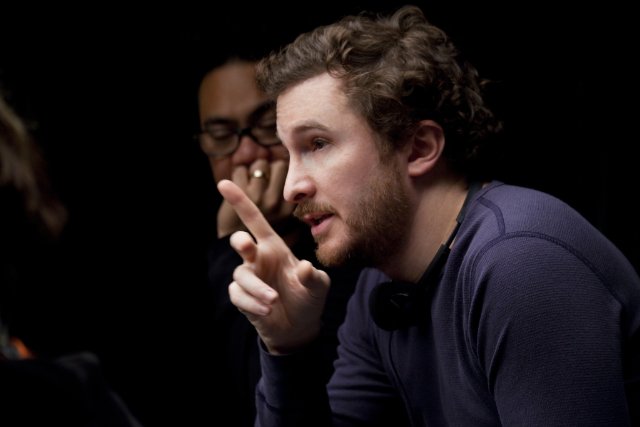 She
said, "She's half girl, half swan," and I realized. "Oh, it's a
werewolf movie." Except it's a were-swan film, and I was going to be
able to take Natalie Portman this beautiful, delicate creature
and turn her into something. So in turning a ballet into a movie you
can suddenly start to do stuff like that. And very much the movie is
the ballet.
She
said, "She's half girl, half swan," and I realized. "Oh, it's a
werewolf movie." Except it's a were-swan film, and I was going to be
able to take Natalie Portman this beautiful, delicate creature
and turn her into something. So in turning a ballet into a movie you
can suddenly start to do stuff like that. And very much the movie is
the ballet.
My composer
Clint Mansell took Tchaikovsky and sort of put it through the
twisted filter of his brain and his electronic equipment. Then we
rerecorded it with a real-live orchestra in London and turned it
into something that is the score of Swan Lake but it's
something very, very different. Like that music that you just heard,
a lot of those ideas are from Tchaikovsky, but through the
brilliance of Clint Mansell.
That music's
been in the public domain now for a hundred years and it's been
underneath every Volkswagen and Bugs Bunny cartoon, and so I think
people associate a lot of those themes with a lot of different
things. So the idea was to take the music and make it darker and
meaner, and ultimately, ballet music's written for ballet, so it's
very hysterical and it goes up and down and up and down.
Movies
definitely have a more consistent, moody atmosphere that you have to
maintain over a longer amount of time, and so that was part of the
challenge is how to take some of the themes and ideas and turn it
into a longer piece. The whole film is actually inspired by
Tchaikovsky.
There's a
whole club sequence where they go dancing, a pretty freaky sequence,
and what we did is we went to the best of electronic musicians in
the world from The Chemical Brothers to a bunch of other guys and
gals, and gave them different pieces of Swan Lake and said,
"Okay, now turn this into a contemporary dance electronic track." So
that's how we got that music.
I think
audiences are interested in worlds that don't get exposed that much,
because there's a whole world there. When we were doing The
Wrestler everyone was like, "Why are you making a film about
wrestling? No one cares about wrestling." But once we went behind
the curtain everyone was like "Oh. Those big muscular guys actually
have feelings." So the ballet world was a similar challenge.
Sister's
Input
My sister was
a dancer growing up and she was very talented, and so it was sort of
in the background for my whole youth but I never knew anything about
it. Then when I graduated from film school I made a list of possible
worlds to explore, and one of them was wrestling and one of them was
ballet. And then we just started working on it and it just came more
and more alive the more we looked into it.
But I don't
think I even had a conversation with her during the research part of
it because she left it when she was in high school and definitely
turned her back on it. I did show her the film when it was getting
close to being finished to get some feedback from a dancer.
She was very
supportive but she's so far from being a dancer at this point. She's
a producer now for CBS News so she's in the media, so she was
looking at it more as a filmmaker than as a dancer. So she wasn't
that instrumental, but growing up with that in the background and
not knowing anything about it, I guess I always wanted to know what
it was all about.
When you look
at ballet it is like when you first hear reggae music; everything
sounds exactly the same. But the more you listen to it the more you
realize there's a lot of depth and a lot of complexity to it, and
the same with ballet. The more you look at it the more interesting
it becomes.
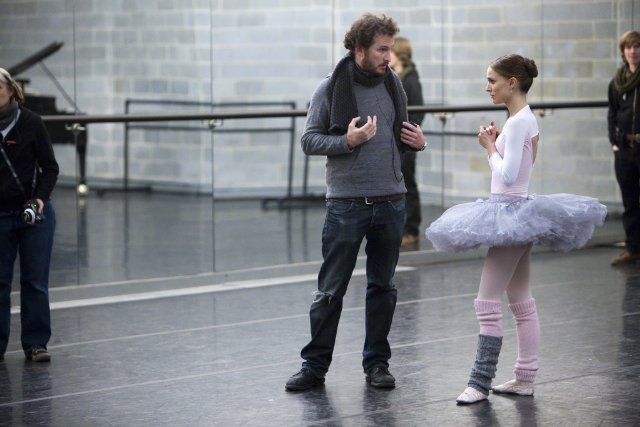 Torturing
Natalie Portman
Torturing
Natalie Portman
I tortured her
character. Her character was tortured in the film. But Natalie is
very, very together, very disciplined, very hard working, and she
probably tortured herself a lot. She started training about a year
before the movie started. I mean that's a tall order to ask someone
to become a ballet dancer, a prima ballerina.
When I asked
Mickey Rourke to become a wrestler probably most of us in three or
four months could do a decent job. Learning how to be a great ballet
dancer is 20 years minimum, so it was a tall order. But Natalie
trained for a year five hours a day and then eight hours a day when
we got closer, and did a pretty damn convincing job. I think ballet
dancers of course will see through the illusion, and people in the
ballet world, but they'll be so impressed with how hard she's trying
that they'll give her a break. But for most people that don't stare
at ballet all the time, it's a pretty convincing illusion.
She trained
from four to thirteen, so that helped a little bit with her turnout
and her hyperextension and stuff, so she could do a lot. Ballet
dancers start training when they're four or five and their bodies
literally change. If you ever see a ballet dancer walking you can
tell a mile away they've got a huge turnout on their legs. Their
bones shift in their bodies, so it's a pretty hard thing to mimic.
She was pretty
solid throughout. There was maybe one day when I changed the
choreography on her that day, which was a really kind of fucked up
thing to do, but the choreography wasn't working for the shot so we
had to kind of change it. We made it simpler but I think it was also
psychologically it's hard when you've practiced something for a long
time to bring another thing in. And by then we were deep in it, she
was pretty exhausted. So that was tough. But she was solid the whole
film, she was a total trooper and it was unbelievably difficult.
She had an MRI
during the shooting because she hit her head during one scene, and
she actually got a twisted rib, which sounds not that bad but it was
stuck under another rib. She actually gets physical therapy in the
film and that's a real physical therapist, that's not an actress.
That was her therapist actually digging into her and it is pretty
gruesome and intense. So I think it was very, very tough on her, but
she's a tough girl.
Getting It
Made
It was really
hard to make. When we made The Wrestler, everyone was like,
"What the fuck are you doing? Mickey Rourke wrestling? You're out of
your mind," and one company in the world gave us the money to do the
film. And then after it did pretty well and people liked it I
thought, "Okay, I've got a movie star, Natalie Portman, an
international movie star, Vincent Cassel, I've got Mila Kunis,
Barbara Hershey and Winona Ryder. It's a sexy, psychological, horror
film set in the ballet world and that's kind of cool." And everyone
said no and it was a real nightmare once again to get the money. It
was probably harder to make than The Wrestler to find the
money to do it.
You get no
respect. You only get respect if you do something that's commercial,
that people want to see. That's the only time you get respect.
Otherwise, you're the only person in the room trying to make the
movie and it's just a challenge.
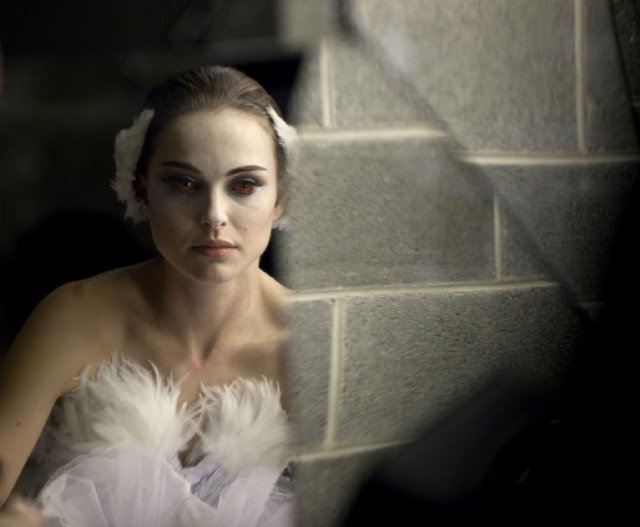 Technical
Issues
Technical
Issues
There were
many. First of all, we were putting on an actual professional
looking ballet, so that was a technical challenge to actually make a
stage come alive like a ballet, and then figuring out how to
photograph it. And ballet, just like wrestling, wrestling you
probably have always seen with a wide shot and two shots on the side
like the WWE does it, but I wanted to bring the camera in the ring
like many boxing movies have. We did the same thing with the ballet.
We took the
camera out of the wings and got it on stage to capture the energy of
it. It's great. After a lot of these screenings we get some doofus
saying, "I never thought I'd love ballet, man. That was great." And
that's great because we wanted to capture the energy, the effort,
the pain, the sweat and tears of how hard it is. That was exciting
and fun to do.
Reflection
and Mirrors
We always knew
the mirror was going to be a big part of the character in the film
and a big visual look in the film for several reasons. Any ballet
studio is filled with mirrors and dancers are always looking at
their reflections to see their line and to see where they are
standing in three dimensional space, and also because the film has
this whole theme of being replaced and the doppelganger and
reflections.
But it was a
big challenge because the mirror effect is like the oldest,
cheesiest horror effect in the world. You're standing in front of
the medicine cabinet, you reach inside to get some tooth paste, you
shut it, and then "Ahh," and everyone's scared.
We didn't
really want to do that; we wanted to try and do something different.
So we really pushed it and we worked a lot with digital effects and
put the camera in places that aren't possible for a camera to be,
and also worked with a lot of one way mirrors and did a lot of
tricks. We knew we were doing a lot of cheap scares because I think
people enjoy them and that will be part of the reason people will
come to see the movie is just to jump, but we just wanted to try and
surprise people as best we could.
Influences
[There's] a
lot of early Roman Polanski Repulsion and The Tenant
were big influences. David Cronenberg's The Fly was a big
influence. Even the Dardenne brothers, who really inspired The
Wrestler, who are these Belgian filmmakers who did film[s]
called The Son and The Child. Great filmmakers. Their
immediacy helped. And of course, a lot of documentaries; Frederick
Wiseman did a couple of documentaries on ballet that definitely gave
us a reality check.
The Red
Shoes
I had heard of
The Red Shoes but I didn't see it until the Hollywood Foreign
Press and Scorsese restoration started to happen and then I was
like, "I'd better watch this movie." But we were really down the
road and there are a lot of similarities between the two films, but
I think that's because they're both set in the ballet world and not
much has changed.
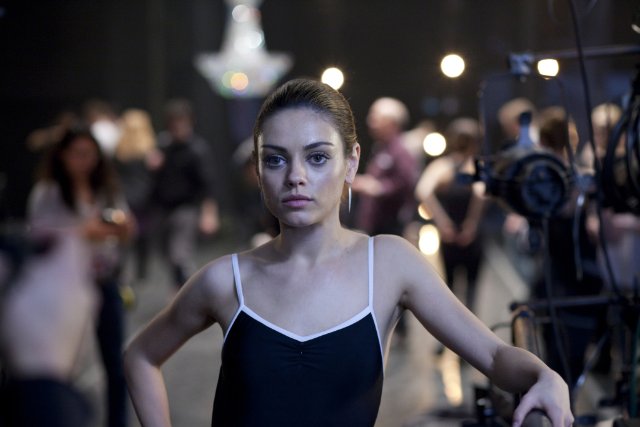 Looking
At the First Cut
Looking
At the First Cut
That actually
is a suicidal moment. I've talked to many filmmakers and probably
the worst day of filmmaking is when you see the assemblage because
you think you've done such better work and it is crap. It's crap for
a lot of reasons because you just haven't started to shape it and
you realize how far you have to go. Because you normally see the
assemblage like a couple of weeks after you finish shooting because
the editing team has been assembling it. And I have a great editor,
it has nothing to do with my editor, but it's still really
depressing until you really get in there and get to know the footage
and own it.
There's so
much finishing work. There's so much sound work that has to happen
and music work. When it's bare and naked and 40 minutes too long
it's really, really, really upsetting. So all you filmmakers out
there keep on going through the assemblage and just try to ignore
it. But I always get drunk the night of the assemblage otherwise I'm
miserable for two, three days.
The hardest is
when I did Requiem for a Dream because that was cut such a
different way and it was the first time I'd worked with that editor,
who's a brilliant editor, but he had no idea. He was just confused
why there were no master shots and so he was trying to make up for
that. He just thought I was out of my mind and it just didn't work.
I was like "No, no, no you don't have to start the scene with a
master shot. You can start on a close up, that's the idea." So that
was a disastrous day.
The
Fountain
Well you've
got to pay attention. I don't know. That was a very interesting one
because the people who really get it really get it; the people who
hate it really hate it. More than any film that's the film that
people get the deepest connections. And the same thing with Hugh
Jackman; he's like, "Those fountain things are creepy, man. They
follow me around and stuff."
It's got this
kind of underground following that seems to be growing as time goes
by so it's cool. We were trying to make a film that was a mystery
and that would hopefully be something people would look back on over
the years, so hopefully that will happen. Tone is a really hard
thing about what's the mainstream feeling for it.
None of my
films have had to figure that out, they've all been for specific
audiences and they've been able to survive that way. The fork and
the staple gun in The Wrestler meant a lot of people in the
Academy turned it off at that point or walked out of the theater and
there are consequences, but the film needed that because he has to
have a heart attack.
There's a
similar line in Black Swan; how far can you go? My take is
there are no limitations, just go for it every time, and that is
often a bit too extreme for some people.
In the case of
The Fountain it was like let's make this an enigma that is
figure out-able and is actually not that complicated but is kind of
fun to work on, but it definitely means certain people who are
spoon-fed stuff a lot and expect that when they go to the cinema
aren't going to go for it. It's a consequence.
All these
films are a little bit of a Luddite. The Fountain was like
please come to terms with your death; it's okay to die. And yet
people are fighting so fucking hard to stay young and stay alive and
ignoring the impact that that's going to have on us and the planet
and all that stuff.
Maybe growing
old is part of life, which in other cultures is really respected and
honored and is a whole part of our philosophy we kind of shut off.
It feels like all these body modifications are all about ignoring
anything that's really connected. Yet I'll be the first one to stick
my iPod in my shoulder as soon as we can. As long as it's over eight
gigs.
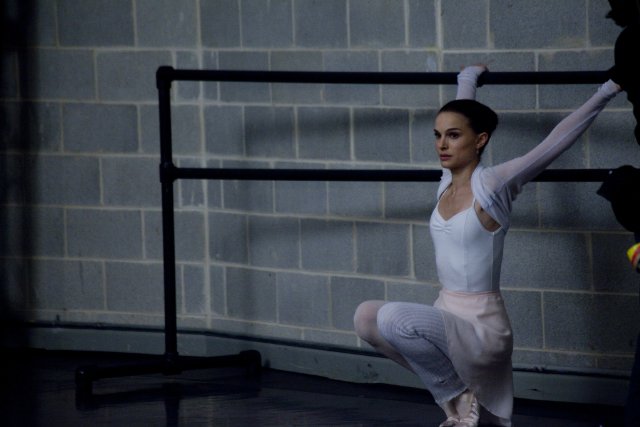 Requiem
for a Dream
Requiem
for a Dream
We did a Blu-ray
version of Requiem and I didn't really get that involved, I
was busy working on this, but my team remixed it and remastered it
and stuff, and they went back to the negative and made sure it
looked right.
At the end
they asked me to take a look at it which I did, and I couldn't
recognize the man, or the young boy that had made that. I was like
"That is not me. I don't know the person that made that film. I
cannot make that film today."
It's really
important to let it go. It's nice when people compliment [me for]
those things because it represents something of who I was back then,
but I don't know if any of that exists. It's just sort of gone and
you let it go and you just try to keep making new work.
It's like an
"exhale" but lots of them happened a long time ago. It represents
what I was thinking about at the time but they're very distant. When
a film happens, it's like having a kid and the kid's finally gone
out of the house. You have a relationship but it's sort of gone.
Afraid of
Failure?
Of course I'm
afraid of it; every single film I've done so far everyone's said no
to. Everyone said to no to. So there's a little fuck-you attitude,
just like I'm going to fucking do it. There's a little punk attitude
to it.
It's kind of
like if I was at a black jack table every single time I've let it
ride I double down. Like Pi to Requiem was a double
down. Requiem to The Fountain was a double down. Some
people would say they took all my chips. Doing Mickey Rourke with
The Wrestler and then going to a ballet movie was the same
thing, but it's like if you fail you might as well fail miserably.
Email
us Let us know what you
think.